BusinessEurope Headlines No. 2021-07
Discussion with Portuguese PM António Costa ahead of the Porto Social Summit
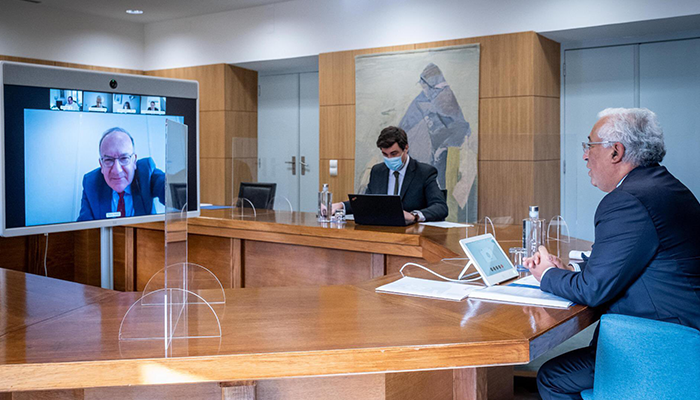
"The Portuguese Presidency of the EU Council can count on our constructive cooperation in the preparations for the Porto Summit and we are ready to play our special role as social partner", said BusinessEurope President Pierre Gattaz during his meeting together with Director General Markus J. Beyrer with the Portuguese Prime Minister António Costa, organised with BusinessEurope's Portuguese member CIP. "On social policy initiatives, there is a need to find more business friendly ways of reaching our objectives", he added. "We also discussed the EU-India Business Roundtable that will take place during the second day of the Summit. We look forward to meeting again the Prime Minister at this important occasion", Gattaz concluded.
Contact: Nathan Munch
Our comment:
Climate Dialogues: Making Europe the first climate-neutral continent
By Alexandre Affre, Deputy Director General
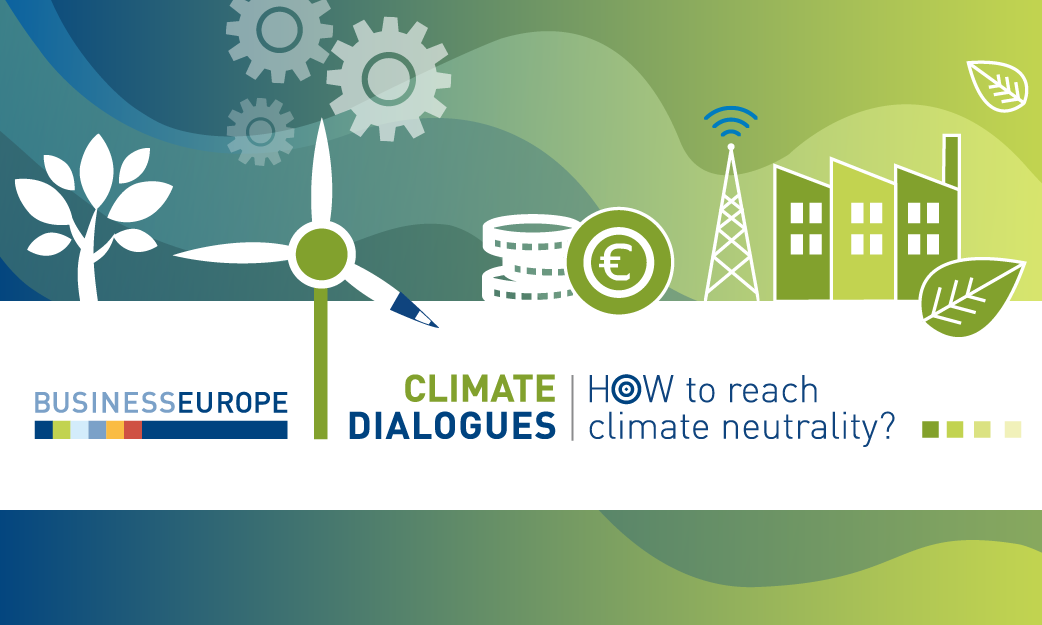 Dear partners, stakeholders, citizens,
Dear partners, stakeholders, citizens,
We invite you to join new BusinessEurope campaign "Climate dialogues: HOW to reach climate neutrality?". It aims at discussing the major 'HOW questions' to develop solutions, with politicians, citizens, non-governmental organisations, scientists, the industry, and any interested person. We want to foster our dialogue with you, all key stakeholders in Brussels, European capitals and worldwide, on moving our economies towards climate neutrality. We are engaging with all our national member federations across Europe to make this campaign happen.
European business is fully committed to making Europe the first climate-neutral continent. The implications of this revolution are huge, with far-reaching impacts on society at large that will gradually materialise. It implies a radical transformation of industrial patterns, business models, consumer behaviour and massive investments in next-generation clean technologies across clusters such as hydrogen, gigafactories, electrification, smart grids, bioeconomy or carbon capture utilisation and storage.
No doubts that European business is firmly embarking on this transformative path. At the same time, no one can ignore that numerous challenges prevail, not the least the socio-economic impact of the Covid-19 crisis which will undoubtedly impact the capacity of many businesses to invest, notably in research and innovation activities.
The speed with which we will overcome these challenges and maximise the opportunities will be determined by our capacity to discuss and collectively answer the numerous 'HOW' questions that still today remain unanswered.
Our campaign wants to foster this dialogue on key 'HOW' questions European industry is still confronted with in its journey towards climate neutrality. We will particularly look at the following four main themes that are central to make this transformation a success.
- Energy supply: how to ensure supply of affordable and low-carbon energy? how to best incentivise the expansion of alternative fuels and energy sources? what infrastructures and technologies are still missing in large scale?
- Industry cooperation: how to support companies willing to cooperate in large-scale cross-border industrial projects?
- Investment gap: how to boost and channel needed investments? what are the best incentives? how to ensure that certain industries are not prevented from transitioning by reducing their access to finance?
- Global dimension: how to conduct the European climate ambition in a world that is only slowly stepping up ambition? how to best calibrate EU carbon leakage measures? What actions should the EU undertake on the global scene?
In these challenging times due to the pandemic, our campaign will use all possible channels, webinars, social medias, videos, interviews, opinion articles and press conferences to reach out to policy-makers, scientists, think-tanks, citizens, NGOs, etc. in order to deepen our dialogue around these 'HOW' questions and hopefully make solutions emerge. If you so wish, don’t hesitate to initiate the conversation by contacting us.
Join our first Climate Dialogues webinar "Energy scenarios towards a climate-neutral EU" on 16 March, register here.
Let’s engage!
Enhanced coordination and cooperation key to strengthening EU's economic migration policy
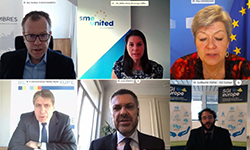 In delivering on the economic migration priorities outlined in the EU Migration and Asylum Pact, it is necessary to strengthen cooperation and coordination between and within Member States. EU policy-making on economic migration should aim to help Member States address their skills needs, taking into account individual labour market specificities. A priority for BusinessEurope is how the Pact will help employers to attract and retain the skilled workers that they need and this particularly includes ICT workers, as well as people with a broader set of science, technology, engineering and mathematics skills. An EU talent pool and skills partnerships with third countries need to be designed with a view to better serving these needs in future, in line with industrial policy objectives. These were the key messages of BusinessEurope Director General Markus J. Beyrer during a meeting with Commissioner Ylva Johansson on 26 February.
In delivering on the economic migration priorities outlined in the EU Migration and Asylum Pact, it is necessary to strengthen cooperation and coordination between and within Member States. EU policy-making on economic migration should aim to help Member States address their skills needs, taking into account individual labour market specificities. A priority for BusinessEurope is how the Pact will help employers to attract and retain the skilled workers that they need and this particularly includes ICT workers, as well as people with a broader set of science, technology, engineering and mathematics skills. An EU talent pool and skills partnerships with third countries need to be designed with a view to better serving these needs in future, in line with industrial policy objectives. These were the key messages of BusinessEurope Director General Markus J. Beyrer during a meeting with Commissioner Ylva Johansson on 26 February.
Contact: Robert Plummer
EU-Mercosur deal will support a more sustainable and resilient economy
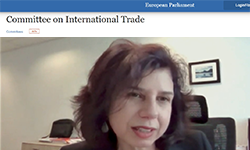 On 25 February, BusinessEurope Deputy Director General Luisa Santos participated in a hearing organised by the trade committee of the European Parliament on the EU-Mercosur trade agreement. "It is important to conclude the agreement for geostrategic and economic reasons, but also to foster sustainable development", Santos stated. "We need to expand our export markets and to diversify our sources of imports: this will support a more sustainable a resilient economic recovery. Today, the Mercosur market is mainly accessible to large companies, because they can navigate high tariffs and red tape, but there is still a huge potential hindered by tariff peaks (duties are at 35% for cars, clothing and leather shoes), customs procedures, testing and certification requirements". Finally, the agreement is the best tool to furthering sustainable development and making significant progress in this area is paramount. "The Sustainable Development chapter is the most advanced so far in our trade agreements. For the first time in the text of a trade agreement, both parties have agreed not only to effectively implement the Paris Agreement on climate change and to cooperate on the climate-related aspects of trade between the two sides, but also to go beyond the commitments of Paris. We expect our major trading partners to increase their ambitions, not lower them", Santos concluded.
On 25 February, BusinessEurope Deputy Director General Luisa Santos participated in a hearing organised by the trade committee of the European Parliament on the EU-Mercosur trade agreement. "It is important to conclude the agreement for geostrategic and economic reasons, but also to foster sustainable development", Santos stated. "We need to expand our export markets and to diversify our sources of imports: this will support a more sustainable a resilient economic recovery. Today, the Mercosur market is mainly accessible to large companies, because they can navigate high tariffs and red tape, but there is still a huge potential hindered by tariff peaks (duties are at 35% for cars, clothing and leather shoes), customs procedures, testing and certification requirements". Finally, the agreement is the best tool to furthering sustainable development and making significant progress in this area is paramount. "The Sustainable Development chapter is the most advanced so far in our trade agreements. For the first time in the text of a trade agreement, both parties have agreed not only to effectively implement the Paris Agreement on climate change and to cooperate on the climate-related aspects of trade between the two sides, but also to go beyond the commitments of Paris. We expect our major trading partners to increase their ambitions, not lower them", Santos concluded.
Contact: Luisa Santos
Discussing how to ensure a strong and global Europe at EPFSF Conference
 Klaus Günter Deutsch, Chair of BusinessEurope's Economic and Financial Affairs Committee, spoke at the European Parliamentary Financial Services Forum (EPFSF) Virtual Winter Conference 2021. The panel debated the most urgent actions to ensure a strong and global Europe. Deutsch stressed that support of companies through liquidity and solvency instruments should remain necessary well into this year especially for those companies that are still operating below normal and are at an increasing risk of insolvency. He also highlighted the role of industrial, financial and taxation policies to support the recovery. Public and private investment should be strengthened and the ongoing work on the Capital Markets Union and the Banking Union should be accelerated to provide better access to finance.
Klaus Günter Deutsch, Chair of BusinessEurope's Economic and Financial Affairs Committee, spoke at the European Parliamentary Financial Services Forum (EPFSF) Virtual Winter Conference 2021. The panel debated the most urgent actions to ensure a strong and global Europe. Deutsch stressed that support of companies through liquidity and solvency instruments should remain necessary well into this year especially for those companies that are still operating below normal and are at an increasing risk of insolvency. He also highlighted the role of industrial, financial and taxation policies to support the recovery. Public and private investment should be strengthened and the ongoing work on the Capital Markets Union and the Banking Union should be accelerated to provide better access to finance.
Contact: Erik Berggren
Patent harmonisation and the role of IP to fight the current crisis
 European, American, Japanese, Korean and Chinese patent users' representatives (BusinessEurope from the European side) met virtually with the representatives of the five biggest patent offices in the world on 25-26 February to discuss topics related to the harmonisation of patent practices and procedures. Industry representatives discussed the proposal on a global assignment and on the harmonisation of certain features in drawings of patent applications. Tony Rollins, representing BusinessEurope, underlined that patent offices and industry should cooperate in countering misinformation on the role of intellectual property, and emphasising its benefit to society, especially in the fight against the COVID-19 pandemic.
European, American, Japanese, Korean and Chinese patent users' representatives (BusinessEurope from the European side) met virtually with the representatives of the five biggest patent offices in the world on 25-26 February to discuss topics related to the harmonisation of patent practices and procedures. Industry representatives discussed the proposal on a global assignment and on the harmonisation of certain features in drawings of patent applications. Tony Rollins, representing BusinessEurope, underlined that patent offices and industry should cooperate in countering misinformation on the role of intellectual property, and emphasising its benefit to society, especially in the fight against the COVID-19 pandemic.
Contact: Elena Bertolotto
EU industrial strategy update: it’s time to act
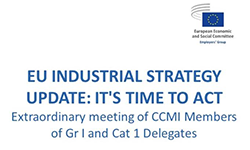 "If we look at the economic situation, we are surely not out of the woods yet. The profound consequences of COVID-19 will remain at the top of the agenda in 2021, a year in which European industry and companies will be still facing high uncertainty. In this context, we welcome the European Commission's timely decision to update its industrial strategy, crucial to overcome the current crisis, protect Europe’s competitiveness and ensure the success of the twin green and digital transitions", said BusinessEurope Senior Adviser Daniele Olivieri, on 4 March during the event "EU industrial strategy update: it’s time to act", organised by the Consultative Commission for Industrial Change (CCMI) of the European Economic and Social Committee’s Employers. The event featured the participation of the European Commission, the EESC Rapporteur on the update of New Industrial Strategy for Europe, the EESC Groups’ and CCMI’s Presidents and other key stakeholders. "The European business supports the goal of reaching climate neutrality by around mid-century, but the EU can only lead as global role model in climate protection if we manage the green transition while maintaining competitive value chains, jobs and companies. The digital transformation of our economies and societies is also a great opportunity, however it must be supported by an incentivising investment climate and by developing trusted conditions for the safe deployment and use of new technologies", concluded Olivieri. Read here BusinessEurope recommendations on the update of the European industrial strategy.
"If we look at the economic situation, we are surely not out of the woods yet. The profound consequences of COVID-19 will remain at the top of the agenda in 2021, a year in which European industry and companies will be still facing high uncertainty. In this context, we welcome the European Commission's timely decision to update its industrial strategy, crucial to overcome the current crisis, protect Europe’s competitiveness and ensure the success of the twin green and digital transitions", said BusinessEurope Senior Adviser Daniele Olivieri, on 4 March during the event "EU industrial strategy update: it’s time to act", organised by the Consultative Commission for Industrial Change (CCMI) of the European Economic and Social Committee’s Employers. The event featured the participation of the European Commission, the EESC Rapporteur on the update of New Industrial Strategy for Europe, the EESC Groups’ and CCMI’s Presidents and other key stakeholders. "The European business supports the goal of reaching climate neutrality by around mid-century, but the EU can only lead as global role model in climate protection if we manage the green transition while maintaining competitive value chains, jobs and companies. The digital transformation of our economies and societies is also a great opportunity, however it must be supported by an incentivising investment climate and by developing trusted conditions for the safe deployment and use of new technologies", concluded Olivieri. Read here BusinessEurope recommendations on the update of the European industrial strategy.
![]() Contact: Daniele Olivieri
Contact: Daniele Olivieri
Skills training that better supports EU industrial strategy objectives
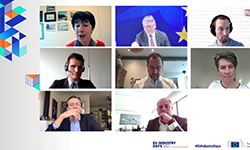 Employers support the European Commission’s and Member States’ efforts to improve the link between skills training and the industrial policy objectives. The key to this is improved skills matching, keeping in mind the diversity of skills needs across economic sectors. To progress, it is first important to develop effective and well-connected labour market and skills intelligence approaches at EU and Member State level. This will enable national governments and social partners to improve the way employment services, social partners and training providers cooperate to efficiently adapt training provision to changing labour market needs. Social partners are situated at the interplay between labour and training markets. They should play the key role when it comes to agreeing on how to make good use of available resources for employee training to support long-term economic growth. More focus is also needed on the coordination at EU level of the necessary national structural reforms aiming to improve the adaptation of curricula and qualifications to changing skills needs. These were the key messages of BusinessEurope’s Social Affairs Director Maxime Cerutti during an EU Industry Week discussion on skills on 25 February.
Employers support the European Commission’s and Member States’ efforts to improve the link between skills training and the industrial policy objectives. The key to this is improved skills matching, keeping in mind the diversity of skills needs across economic sectors. To progress, it is first important to develop effective and well-connected labour market and skills intelligence approaches at EU and Member State level. This will enable national governments and social partners to improve the way employment services, social partners and training providers cooperate to efficiently adapt training provision to changing labour market needs. Social partners are situated at the interplay between labour and training markets. They should play the key role when it comes to agreeing on how to make good use of available resources for employee training to support long-term economic growth. More focus is also needed on the coordination at EU level of the necessary national structural reforms aiming to improve the adaptation of curricula and qualifications to changing skills needs. These were the key messages of BusinessEurope’s Social Affairs Director Maxime Cerutti during an EU Industry Week discussion on skills on 25 February.
Contact: Robert Plummer
Calendar 
- 15 March: meeting of the Eurogroup
- 16 March: Climate Dialogues webinar - Energy scenarios towards a climate-neutral EU
- 24 March: Tripartite Social Summit
Not yet a subscriber? Register here.
Reminder: please have a look at our privacy policy